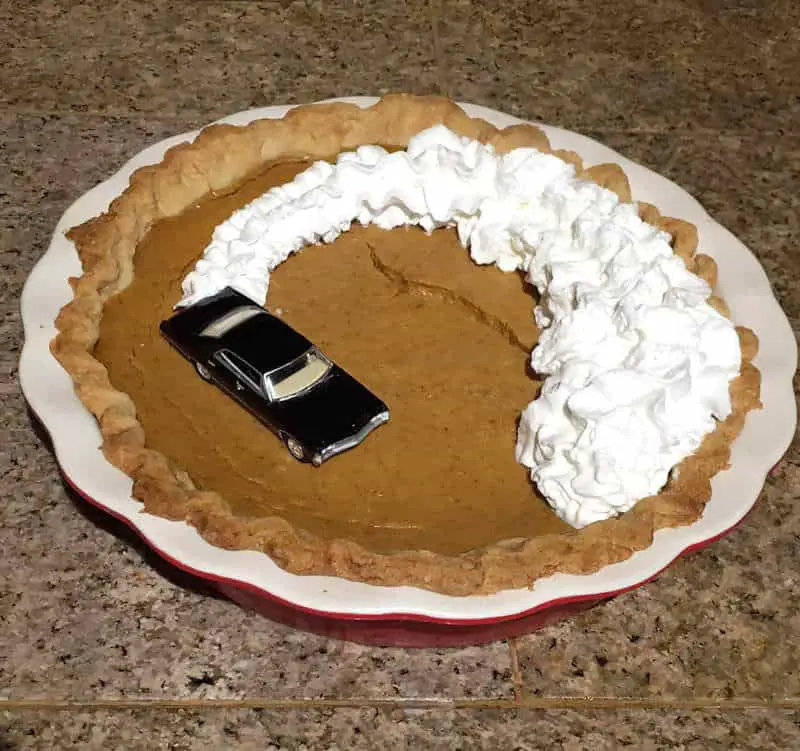I wish I’d never seen Breaking Bad because then I could watch it for the first time again. Failing a visit to Eternal Sunshine of the Spotless Mind, I’m stuck with the recommendations of other people on the interwebs, who all seem to come up with the exact same list.
Predictably, given how AI currently works, when I tried a dedicated AI Film Recommendation site to help me with more expansive offerings, the machine spewed back the same few shows I’ve already seen recommended. (There’s not much sophisticated about ‘sophisticated plagiarism’, yet.)
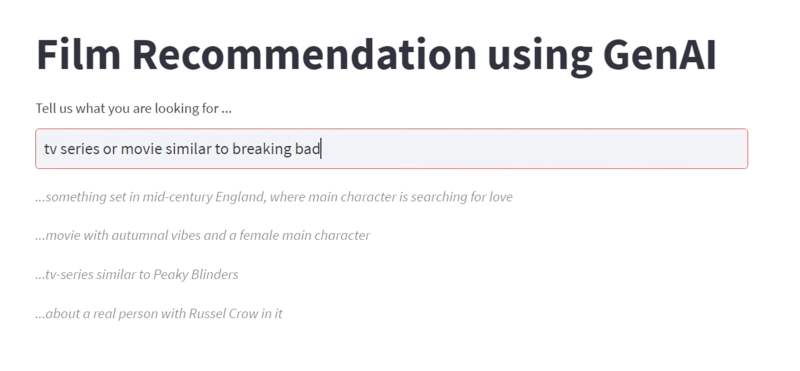
THE STANDARD RECOMMENDED TV SHOWS IF YOU LIKED BREAKING BAD
- Narcos (2015): Set and filmed in Colombia, the series tells the true story of how the cocaine trade emerged in the 1970s. It follows the efforts of DEA agents as they try to bring down the notorious drug lord Pablo Escobar.
- Ozark (2017): The series revolves around a financial planner who is forced to relocate his family to the Ozarks after a money-laundering scheme goes wrong. As he gets deeper into criminal activities, he must navigate a treacherous web of alliances and survive. The show is a great example of Rural Gothic.
- Better Call Saul (2015): The series follows the transformation of Jimmy McGill, a small-time lawyer, into the morally compromised lawyer Saul Goodman. It delves into Jimmy’s personal and professional struggles as he enters the criminal underworld.
- The Wire (2002): Chantal is employed one summer to look after Paul, 16. He is suffering from an incurable illness that contributes to his violent, aggressive temperament. With Nelly, the family cook, to help, Chantal tries to befriend the young patient. To escape the oppressive reality of her job, Chantal dreams. She dreams of her favorite singers and other popular idols who reassure her the time it takes to sing a few songs.
- Peaky Blinders (2013): The series follows the Shelby crime family, led by the charismatic and ruthless Tommy Shelby. They operate illegal betting businesses and face off against rival gangs, government entities, and other challenges.
- Sons of Anarchy (2008): The series follows the Sons of Anarchy Motorcycle Club, Redwood Original (SAMCRO), based in the fictional town of Charming. It delves into their criminal activities, internal power struggles, and the consequences of their choices.
- True Detective (2014): Each season of the series presents a self-contained story following different characters. True Detective explores complex crimes, the psychological toll on detectives, and the blurred lines between good and evil.
- The Sopranos (1999): The series follows Tony Soprano as he tries to balance his role as a family man and the leader of the DiMeo crime family. It delves into his struggles with mental health, the challenges of organized crime, and the dynamics of power.
- Mindhunter (2017): The series follows two FBI agents who interview imprisoned serial killers to understand their psychology and solve ongoing cases. It delves into the complex minds of criminals and the toll it takes on the agents.
- Boardwalk Empire (2010):BTS documentary about the HBO show Boardwalk Empire.
Credit where credit’s due, that AI film recommender site has a nice interface. But how is it that I absolutely adore Breaking Bad, yet I don’t ever think much of lists of shows recommended for lovers of Breaking Bad?
Working theory: The things I love about Breaking Bad are not the same things other people love about Breaking Bad. Also, the standard list is masculine in some essential way. I am not a masculine person.
Here’s what I’m talking about:
- I absolutely hate Sons of Anarchy as an absolute w*nkfest of a midlife crisis motorcycle fantasy. (However, the show unexpectedly appealed to many women, who identified with the women.)
- I watched The Sopranos all the way through but I wouldn’t bother with a second viewing. (Here’s my analysis of The Sopranos Pilot, which indeed, uses all the same tricks as the Breaking Bad writers when creating empathy for the husband and subtracting empathy from his wife.)
- True Detective is too much of men sitting around yap-yapping with each other plus the main guy, what’s his drawcard? How did he hold the attention of that hot young girlfriend whose naked breasts we are invited to objectify from a straight male gaze in the pilot episode? This show does not speak to me.
- The Wire is smart but it’s work. I love the teacher season. I may watch The Wire again but with subtitles turned on so I can somewhat follow the lingo.
- I thought Better Call Saul was going to be better because I like that character a lot. But it’s still not Breaking Bad. Turns out I don’t want to see Saul unless he’s in Breaking Bad.
- Ozark has a lot of surface similarities to Breaking Bad, including the cheating wife and the put-upon husband just doing his best aspect, which is the one main criticism I have of Breaking Bad, as it turns out. Didn’t need that replicated. The setting is evocative, though.
If you basically feel the same way as me about those shows, I do have some personalised, hand-picked recommendations for you. Drumroll: A human-curated list of What To Watch After You’ve Sadly Finished Breaking Bad, which is basically a list of my own favourite TV shows, with a few movies as well.
WHAT I LOVE ABOUT BREAKING BAD, SPECIFICALLY
- Breaking Bad is technically melodrama, even though that word gets a bad rap. Hardly anyone uses the word in its true sense. Turns out most of us really love melodrama even if we wouldn’t call it that. Breaking Bad features the perfect level of melodrama. (Not so much that it feels false.)
- Terrible things happen in Breaking Bad, but the terrible stuff is balanced perfectly with humour. I have a special weakness for basic humour. The lines “Hey! I’m tryin to pinch one off in here!” or “If I ever develop two anal polyps I’ll know what to call them” can still crack me up whenever I think about them.
- I love the focus on family, and the groundedness of the suburbs. I love stories about bad things happening in relatable spaces — gimme the foodcourt at the mall, the local school, the playground. The burbs are the perfect example of a Snail Under The Leaf Setting. (Everything looks fine, but only on the surface.)
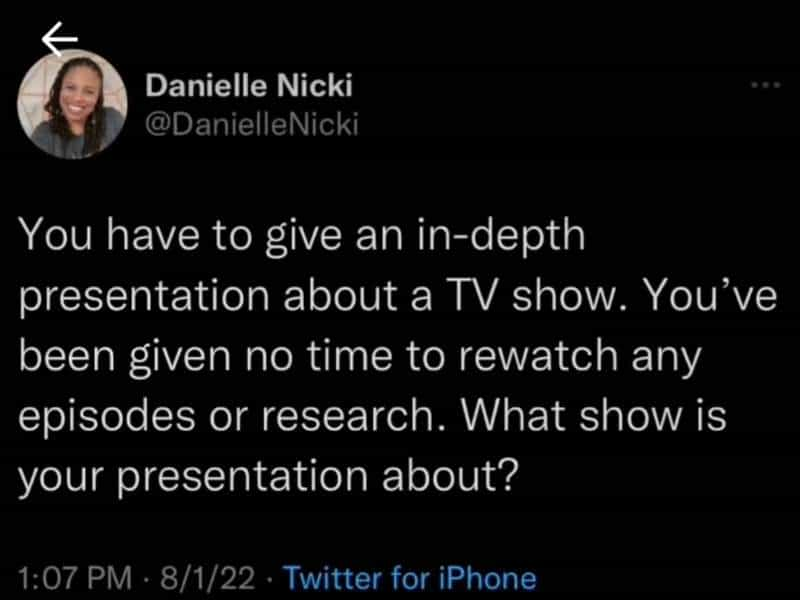
WHAT TO WATCH AFTER BREAKING BAD
Fingers crossed you haven’t seen all of these recommendations already. The following descriptions are spoiler free.
ANIMAL KINGDOM
The family portrayed in American TV series Animal Kingdom started out as a real Australian crime family. Here in Australia, they’re notorious. I’ve heard Smurf (the real-life matriarch) interviewed on the radio. She’s a fascinating piece of work. Next came the Australian movie based on this family. Then came the American TV drama transplanted to a San Diego setting and completely fictionalised, except for the fact that there’s a matriarch called Smurf and she trained her sons to be criminals.
I ONLY RECOMMEND THE FIRST FEW SEASONS. After that, the characters are walking around in a depressive slump — as you would, because cPTSD is real — but that’s not what I want to see for entertainment. Watch the first few seasons for the joyful heists and evil lurking in the suburbs.
I also appreciate the character of Smurf because she is a genuine psychopath and we don’t get to see many woman psychopaths, at least not making a smoothie for breakfast in their beautiful home, which they purchased with their wonderfully managed crime proceeds. Also like Breaking Bad, go deep enough into the structure and you’ll find fairytale archetypes.
I’ve written about the fairytale basis to Breaking Bad here, and the fairytale basis of Animal Kingdom here.
BIG LITTLE LIES
Big Little Lies is another American TV show which originated here in Australia and was then transplanted (beautifully) by HBO to an American setting. This time the setting changed from Sydney’s Northern Beaches to Monterey California.
Again, we’ve secrets in the suburb, crime, murder and a focus on family. This story also investigates domestic violence, so content note for that. That said, the counsellor scenes were admired by actual therapists who said the sessions looked realistic, for once. Also, this is a depiction of domestic violence we don’t see much of on TV.
THE KILLING
Apart from being a crime show, there’s not much obvious crossover between The Killing and Breaking Bad apart from the fact that I personally really enjoyed both. I watched the American remake of this Danish TV series starring Mireille Enos and Joel Kinnaman. Note that I’m not a massive fan of Scandinavian crime, but I do like this one, at least, I like how the Americans did it. They set it in Seattle, with a moody, rainy atmosphere.
Okay, now I think about it, Mireille Enos is smart like Walter White and she teams up with Joel Kinnaman who has Jesse Pinkman vibes, except he’s much smarter than he looks. (Jesse also gets smarter in the fifth season, and not just with the street smarts.)
This show does have a political thread with a guy running for mayor. American shows really do love their politics, at least compared to Australian drama where we very rarely watch political subplots in our homegrown dramas.
Like Breaking Bad, The Killing was created by AMC. Also like Breaking Bad, there was a fight to get the darn thing made. But unlike Breaking Bad which had no trouble justifying its existence after a super successful first season, The Killing kept getting killed. The Killing was cancelled twice by AMC itself, then later revived by Netflix who ordered the fourth (and final) season.
BIG LOVE
On the surface, Big Love has literally nothing to do with Breaking Bad, right? Except it’s all about family secrets in the American suburbs, this time involving the LDS church in Utah.
The final two seasons of Big Love are much faster paced and have a different vibe from the first three, but I really did enjoy this show.
I suppose the Breaking Bad similarity is this: Both dramas feature main characters awkwardly straddling two completely different worlds. In Breaking Bad it’s Albuquerque suburbia versus the underground world of drugs. In Big Love it’s Utah suburbia versus the compound where several of the main characters grew up in a fundamentalist, patriarchal cult.
So there’s that — the interrogation of toxic forms of masculinity, if that’s how you read Breaking Bad. (I did.)
FRIDAY NIGHT LIGHTS
I recently watched all seasons back to back. The first time I watched this show I was irritated by the steady cam. Felt annoyed and also seasick.
Not sure what changed when I went back years later but this time that aspect didn’t bother me.
What’s interesting about Friday Night Lights is that it was originally made for a male audience. But after the first season, the network was surprised to learn that the show had garnered a mostly female audience. They decided to start catering to a female audience.
We surely have Connie Britton to thank for that. She is always fabulous, and these days plays a certain type of relatable white American woman who manages to triumph in both the working world and in the domestic sphere.
To be clear, I have no interest in American football. Each episode features the game at its climax, but the rest of the drama of the community holds up on its own.
Like Breaking Bad, Friday Night Lights touches on a number of social issues. Both have something to say about the American health care system, for instance.
Personally, I think Friday Night Lights could be a bit more progressive than it is, but then I don’t live in Texas. The queer rep is there, but I find that especially disappointing. Also a few feminist issues, but then, I have feminist issues with Breaking Bad as well.
And really, I owe it to Friday Night Lights for realising after the first season that their main fanbase was women, not men, as they had predicted. But instead of cancelling the show they made it MOAH for women. This is incredibly rare.
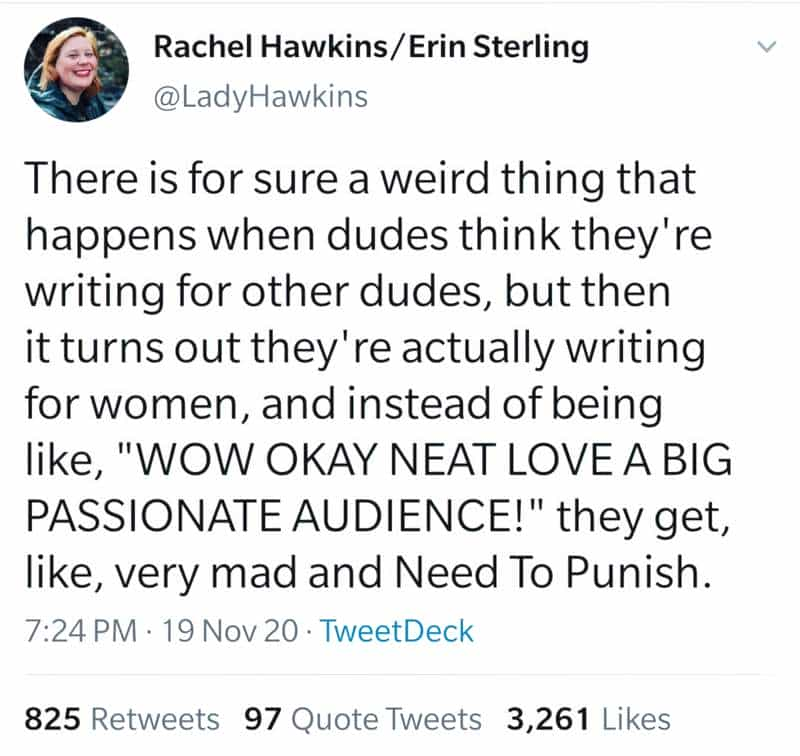
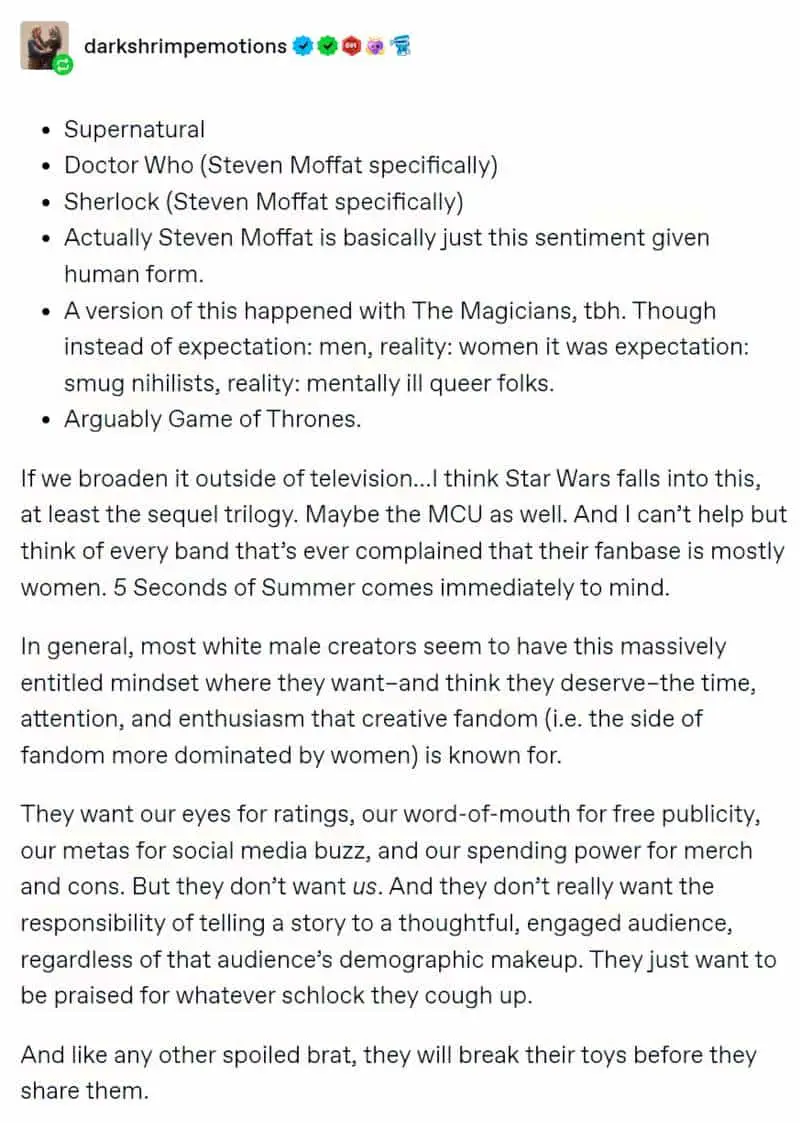
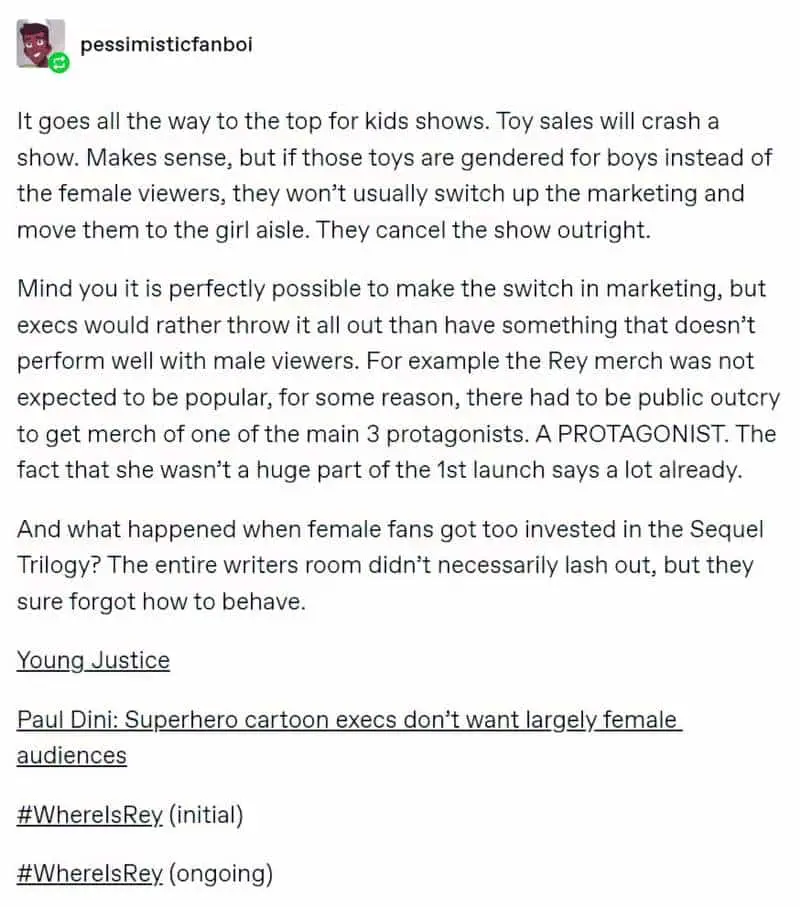
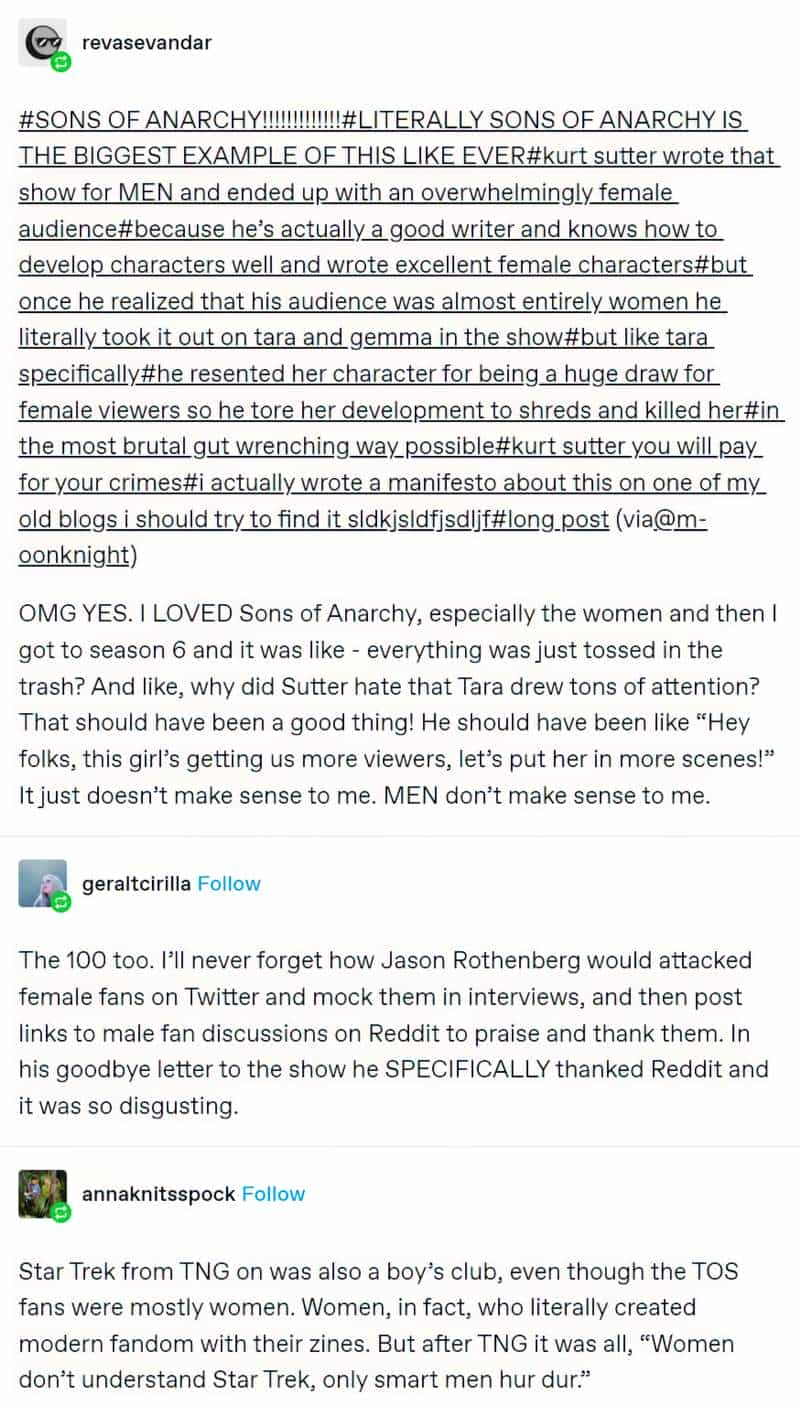
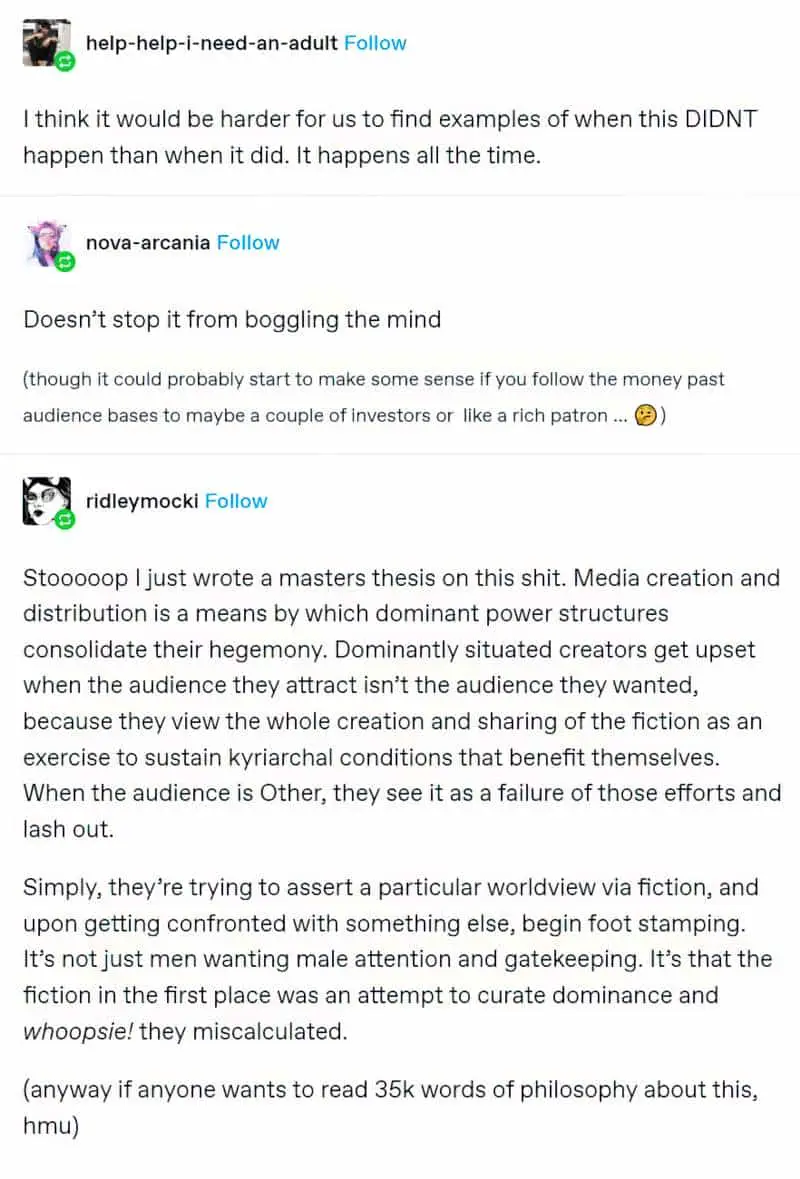
- ‘Star Wars: The Last Jedi’ Owes Its Box-Office Success to Women, a 2017 Newsweek article
- Star Wars: The Rise of Skywalker was designed to be the opposite of The Last Jedi from Vox
Comments on the original Tumblr post mention other examples:
- Teen Titans was very popular among girls so Cartoon Network cancelled it to maintain market separation.
- Supernatural was intended for dudes but got a huge female audience so they literally wrote a character called Becky who was a female audience representation. She was a fan of books literally written of the lead characters lives. They made her the most pathetic creepy girl ever, and had the leads call fans like her ‘freaks’.
- The Dresden Files TV show was literally cancelled because it was attracting women viewers instead of the desired 18-35 male demographic and SyFy Channel President Bonnie Hammer thought that women didn’t like science fiction. Again: The woman President of the SyFy Channel thought that women didn’t like science fiction.
- Stargate Atlantis was cancelled for this very reason – the creators wanted to attract a male audience and made Stargate Universe, which flopped. The executive producers were so angry that women were watching they cancelled two TV shows and aborted a conclusion movie to get a crappy single season of a more ‘manly’ show.
- The entire Marvel Cinematic Universe. It took ages for Black Widow to get a movie because they didn’t think she appealed to young boys (the actual audience).
- Marvel
- Young Justice
- Motorcity, perpetrator Disney
- Star Trek, perpetrator Rick Berman. Lucille Ball saved Trek and without her, the show wouldn’t have made it past the first season.
- Doctor Who is a 50+ year old show that was invented by a woman and was specifically meant to be a show that could cater to people of any age and gender, and then Moffat came along and decided to uproot all that
- Nickelodeon got mad about Avatar: the last airbender too. There was a large female audience. Also they wanted Aang to have a battle suit and the creators refused, which is why Aang is in the really huge and ridiculous armour in that one episode
- Star Wars: It’s telling that they killed off the character that women related to the most.
- Sherlock included an episode which not only ridiculed shippers but mocked the fans for even trying to figure out how Sherlock faked his death.
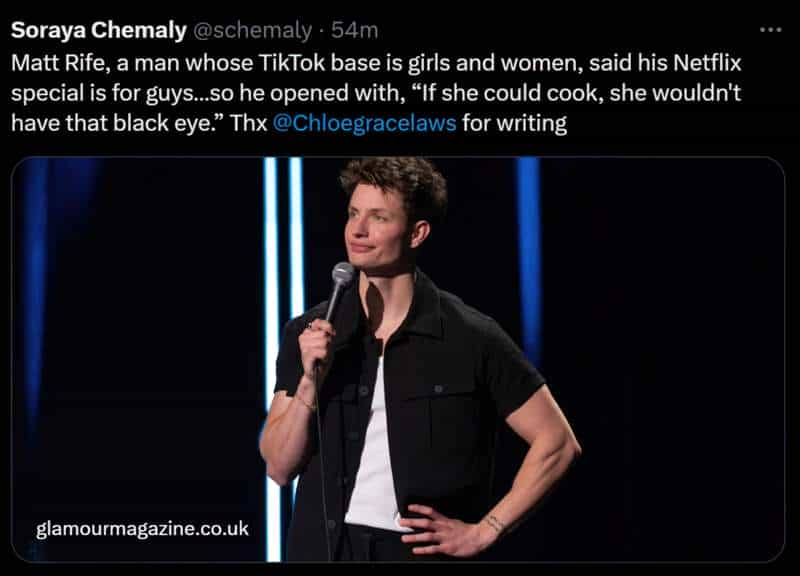
The phenomenon described is known as ‘gender flight’, a specific outworking of misogyny.
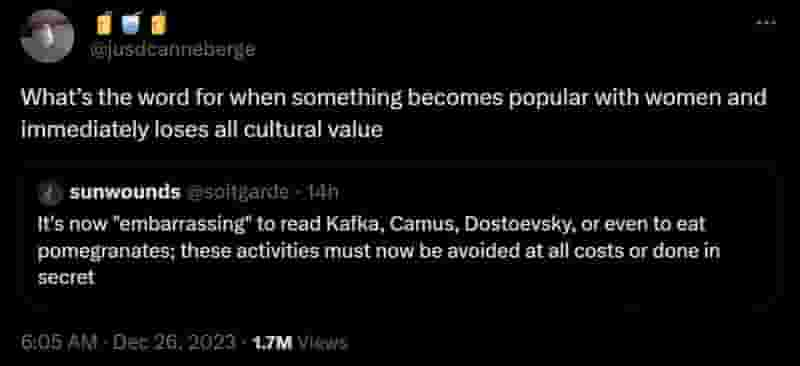
As Women Take Over a Male-Dominated Field, the Pay Drops. “Feminization” is generally the word used to describe this phenomenon, but feminization doesn’t quite cover it.
When the inverse occurs — when men appropriate things previously for everyone — this is sometimes called ‘mentrification‘.
When something, especially in pop culture, becomes popular among men aiming for alpha status, this is known as ‘Sigma Male’ content. Think Fight Club, Catcher in the Rye, Camus.
When something becomes popular among women, it often gets its own name, aided by the force of marketing. Women diet; men biohack.
SIX FEET UNDER
An oldie but a goodie! I watched it again quite recently and have some issues, sure, but it mostly holds up. It definitely still holds up as great storytelling!
Again, we’ve got characters in the suburbs navigating two separate worlds, this time in the very same house, as the Fisher family tries to live like a normal-as-possible family upstairs, but in the basement they keep dead people. This is a funeral parlour. (Also, Americans do weird things with their dead.) There are some similarities with the character arcs too, though I’m avoiding spoilers.
It’s worth noting how important this show was for queer representation on TV.
LONESOME DOVE
It’s been said that Breaking Bad is a neowestern. If you’re pretty sure you liked the Western aspects of Breaking Bad and you’ve not investigated any actual western stories, first of all know that almost no western made after WW2 is a Western — they’re all anti-westerns now.
Lonesome Dove is a Pulitzer Prize winning western from the mid 1980s written by Larry McMurtry who died just a few years back. It’s been said that if you only read one Western in your life, make it that one. Sure enough, Lonesome Dove is my favourite series of all time.
There is also a limited TV series made in the 1980s. You may find it difficult to get your hands on it now and the CGI is ridiculously crap, but I really like it nonetheless. It’s got big name actors in it. Watch them when they were young.
NO COUNTRY FOR OLD MEN (FILM)
We’re talking about TV series right now, but if you loved Breaking Bad and haven’t seen No Country For Old Men, the movie, I bet you’d love it. The audiobook is also really immersive. Written by the late Cormac McCarthy, of course.
I think of this now because both Lonesome Dove and No Country for Old Men star Tommy Lee Jones the actor, who funnily enough now lives on the cattle ranch he owns in Texas. (I guess this is only funny if you know his character in Lonesome Dove.)
MAD MEN
Mad Men was super popular for a few years, remember? This is yet another show where I couldn’t wait for the new episode to drop each week.
A few thoughts about Mad Men, though I could say MANY:
- Don Draper is thought by experts to be the perfect depiction of a narcissist. So if you don’t have a handle on what a narcissist actually is, watch this show. I ended up concluding that Walter White is an equally malignant narcissist.
- In Breaking Bad the main characters are men, but the women get their own arcs as well. The same goes for Mad Men. Peggy and Joan were eventually considered ‘secret main characters’. That said, women who have a history of sexual harassment may find this show confronting. I’m not confident the main writer aimed to illuminate women’s stories. Mad Men was made prior to the #MeToo movement and it shows.
- Each episode of Mad Men is structurally unique. There’s literally no episode format. That aspect is part of what makes Mad Men so interesting from a storytelling perspective. Breaking Bad also features a lot of variety — some weeks they’re in the home, other weeks conducting a heist.
HAPPY VALLEY
We’re crossing the pond now of course. All of the previous recommendations are set in the USA but this is set in England’s Calder Valley.
I should have put this first because Happy Valley is EVERY BIT AS GOOD as Breaking Bad. It’s got crime, it’s got drugs, it’s got psychopaths.
In fact, I’ll say it, in many ways Happy Valley is even better. It stars a woman. A complex, imperfect woman, whose confidante is another woman. Until you see Happy Valley you don’t fully realise how rare this is in fiction.
I’ve written about season one of this wonderful show here. All seasons were equally good, and the writer (who is neurodivergent) waited until the main character’s young son had grown into a teenager before finishing the final season off and tying up the story. If you’ve seen the 2014 film Boyhood, it’s as wonderful as that. None of the actors were replaced — they all came back despite the covid restrictions around filming, which was apparently a nightmare, but you wouldn’t know from looking at the final product.
I do love Sarah Lancashire the actress, but none of her other fictional characters hold a flame to Catherine Cahill. She was perfectly cast. I’m devastated we’ll never be seeing Catherine Cahill in anything again. (That doesn’t mean the character died, by the way. It means the show was beautifully tied up.)
MARE OF EASTTOWN
Honestly, I don’t think this TV series stuck the landing. But. It’s an obvious homage to Happy Valley, American version.
If you’re finding it hard to keep track of how the characters are related, you’re not the only one. I have an explainer right here, spoiler free.
WHITE LOTUS
I’ve said plenty about White Lotus here. Loved it. Can’t wait for the next season. A character in Season One is funny in the way Saul Goodman is funny, but I’ll leave you to guess which one I’m talking about.
THIS COUNTRY
Back to England now, for a fly-on-the-wall mockumentary with a sense of humour right up my alley. Two cousins live in a small English town with no employment prospects and even less self-awareness. This Country features some character archetypes you don’t see anywhere else, which I appreciate.
AUGUST: OSAGE COUNTY (FILM)
Not everyone who loves Breaking Bad will love August: Osage County. I know this for a fact because my spouse loves the former but finds the latter a big ole bag of misery.
It took me a while to appreciate the dark humour of August: Osage County. Why did I watch it three times if I didn’t enjoy it the first time? Well, I must’ve enjoyed it the first time as well, mustn’t I.
Like Breaking Bad, this film (based on a play) attracted a cast of excellent actors, is set in the middle of American nowhere, and is basically a domestic drama.
DOUBT (FILM)
Look, I clearly love films which were originally plays. Because here’s another one. Doubt is one of my all-time favourite films. More Meryl Streep.
Like Walter White, the Meryl Streep character is canny and smart and tricky. I guess that’s the crossover.
NOMADLAND (FILM)
The book is great and so is the film. Like Breaking Bad, Nomadland offers an insight into a disenfranchised USA population. Whereas Breaking Bad can sometimes veer towards making fun of disadvantaged communities, Nomadland treats everyone with empathy.
THE POWER OF THE DOG (FILM)
Oh, you either love or hate this one. Filmed in New Zealand, set in Montana, many American viewers asked, “How did they make Montana look so beautiful?”
As a New Zealander, I would bring that up, wouldn’t I.
Look, the ending takes a bit of work to figure out. I wrote about it.
THE BRIDGES OF MADISON COUNTY (FILM)
I have a love-hate relationship with this film. But here’s what it does give us: Big, expansive American swathes of nothin. If you’re feeling cooped up in the city and are hankering for some more of that Albuquerque spaciousness, you might find this retro watch enjoyable, I dunno.
THELMA & LOUISE (FILM)
If you haven’t seen Thelma & Louise in years, give it another go. It holds up to subsequent viewing even though you probably know the ending. In this household, it’s our Christmas movie.
Why? No idea. Let’s just call it the anti-Christmas movie.
AMERICAN HONEY (FILM)
If you like Breaking Bad you may well love the work of female director Andrea Arnold — a British director who sometimes crosses the pond. American Honey is a road trip story following a young woman who gets caught up in a kind of cult — travelling all around America selling magazine subscriptions.
Fish Tank, by the same director, is also very good. This story is about a young woman who lives in low income housing in an area with massive social problems, kind of the English equivalent of where Walt Junior winds up living with his mother after the court case?
And if you enjoy Fish Tank, revisit Thirteen, a 2003 film with similar themes.
THE WRESTLER (FILM)
Right up there as an all-time favourite, alongside Thelma & Louise. Critics love this one. But The Wrestler is a tragic story. Fair warning.
HUD (FILM)
This is the oldest film on my list, made in 1962. I can’t tell you about the Breaking Bad crossover without spoiling the ending, which is similar in theme if not in plot.
(Like Lonesome Dove, this film is based on a Larry McMurtry novel.)
DELIVERANCE (FILM)
Should I recommend Deliverance even though it was terrible for Appalachian people? I dunno, make up your own mind I guess? The other moral issue is, Burt Reynolds endured an injury in the making of this film which affected him for the rest of his life.
Like Breaking Bad, Deliverance explores different forms of expected masculinity. So really, it depends how you watch it. If you come away thinking, Well I’m never going to Appalachia because Appalachia is full of in-breds and psychos, that would be the exact wrong takeaway.
SILENCE OF THE LAMBS (FILM)
I have the same conflict recommending Silence of the Lambs, which had an overall nasty impact for the trans community.
On the other hand, it’s a great movie.
TRUE GRIT (FILM)
If you’re watching with kids, go with the 1969 original. Otherwise the later remake by the Cohen brothers. Like Breaking Bad, the setting of True Grit is Western, some of the tropes are Western, but it’s not really a Western.
BROKEBACK MOUNTAIN (FILM)
Or read the short story. Note that this is one mis-marketed film. Think of it as the tragic story of a hateful community rather than a lovely gay love story and you won’t be shocked and disappointed. In fact you’ll be suitably disturbed.
THE HOMESMAN (FILM)
Another Tommy Lee Jones film. This time with Hilary Swank. I compare The Homesman to Million Dollar Baby, and not just because both feature Hilary Swank.
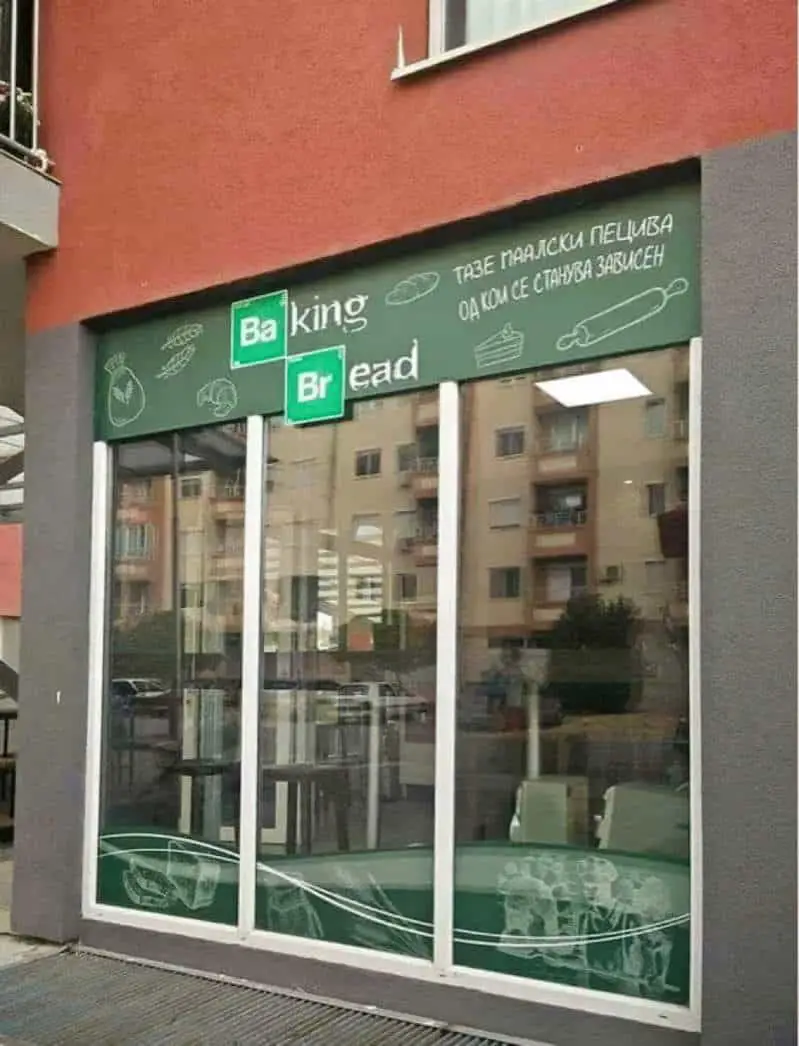
BREAKING BAD EASY BIRTHDAY CAKE IDEA
If you can get your hands on one of the alloy diecast model cars featured in Breaking Bad and a can of whipped cream, all you need is a store-bought cake and you have yourself a Breaking Bad themed birthday cake.
Unfortunately, it’s not so easy to find a diecast model of a 2004 Pontiac Aztek but you may be able to find a cheap 2009 Dodge Challenger, or something that looks very similar, in regular sets of toy cars sold to kids.
